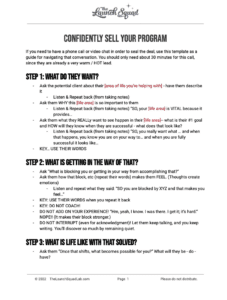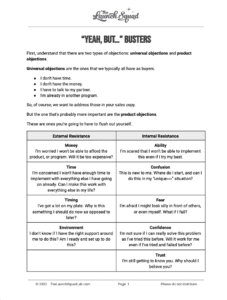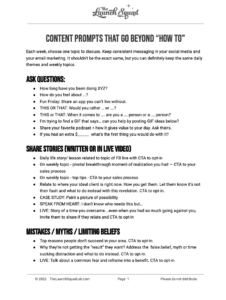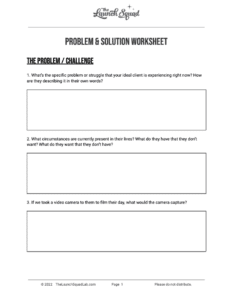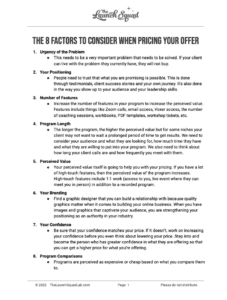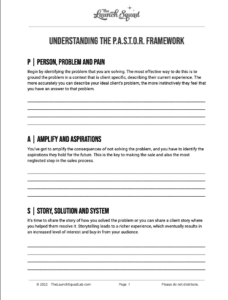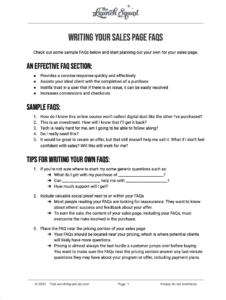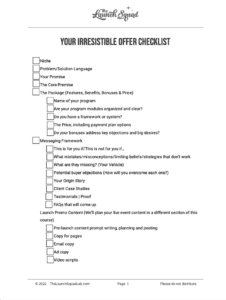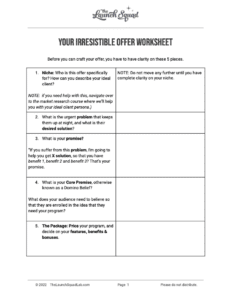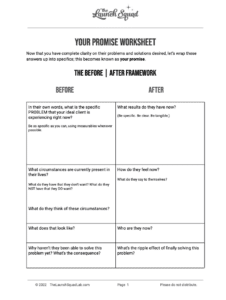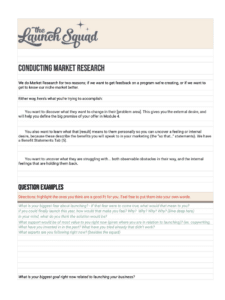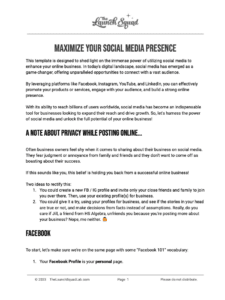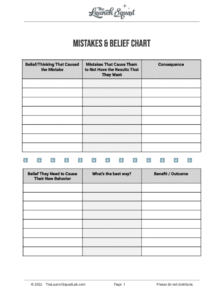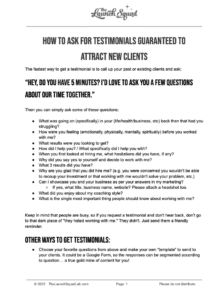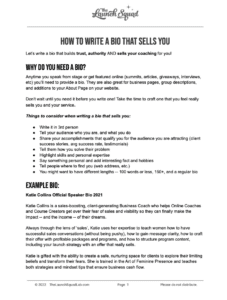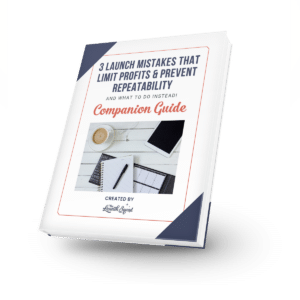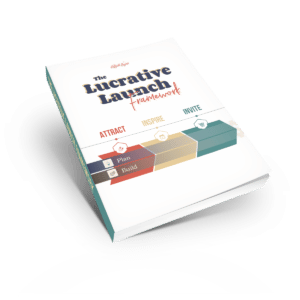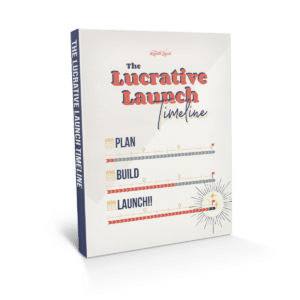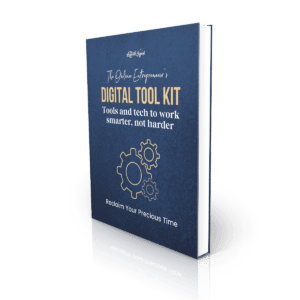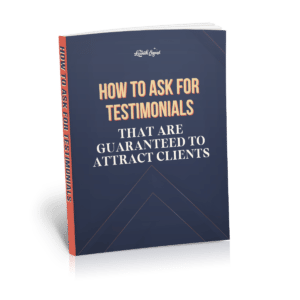In today’s episode, we’re talking with Business and Marketing Coach Kinsey Machos about how to stand out in a saturated market without dumping your precious income into paid advertising.
Kinsey is the Founder and CEO of Kinsey Machos, LLC, and she currently pours into her clients as a Business & Marketing Coach. She helps her clients dial in their messaging and marketing strategy so they have the systems in their businesses to attract and enroll high-paying clients consistently. When Kinsey isn’t geeking out on marketing, she and her husband are wildly immersed in the beautiful chaos with their three kids, sneaking out occasionally for live music, tropical getaways, and mountainous adventures.
Jeffrey: Welcome to the light in your launch podcast. Today, we're talking about how to be heard through the noise of a crowded marketplace. Stay tuned.
Announcer : Hey, we're the Launch Squad and this is the Lighten Your Launch podcast. We teach coaches and course creators how to lighten their launches. We're bringing you all of the tips and strategies to take your launch from intimidating to money-making. In this podcast, we talk about everything; the sales, strategy, mindset, technical and spiritual aspects of running your best launch ever. So if you're feeling overwhelmed and unsure of the next right step, we're here to bring clarity, confidence, and excitement into your next launch. This is the Lighten Your Launch podcast.
Katie: Welcome back to the show. I'm Katie Collins, and I'm back again with Jeffrey Sarano. And today we want to talk with our very special guest about attraction marketing, standing out in a crowded marketplace and more so Jeffrey, will you please introduce our guest?
Jeffrey: I would be happy to after checking all the boxes of a successful life, the dream job, the perfect family, a great home all before the age of 30, there must be only one direction to go down, but that's not the case here. It turns out you can reinvent yourself. Our guest today actually walked away from the golden handcuffs of a six figure salary to step into a more powerful version of herself with grace confidence and clarity, which translates incredibly into a new sense of motherhood, marriage, and business featured in CBS, Fox, NBC and Yahoo finance. She shares her story about fully replenishing her six figure income within her first year of business as a business coach and marketing strategist. Please welcome Kinsey Machos, Kinsey. Thank you so much for joining us here on the light in your launch podcast.
Kinsey: Oh my gosh. You guys thank you for having me. And that was such a great introduction. Thank you so much.
Katie: Awesome. Awesome. Yeah, we're really glad to have you. And you know, like, as I was sharing with you before we hit record, there's so much overlap and goodness, um, with, you know, what we stand for and what we share and what you talk about. So I think it's going to be a very juicy conversation and we're going to be agreeing with each other a lot. I love it. Um, but one of the things I really appreciated about you, um, was so much of your content marketing, you know, your Instagram, like you just had some really solid posts in there. And so I wanted to start off just by talking about, you know, what does that look like for you? Like the attraction quote, unquote marketing techniques and especially the word organic. So I see a lot of coaches wanting to throw money at problems like, oh, I'll just run Facebook ads and I'll build my list that way, or I'll build my audience that way. And while that's one way, I always promote organic marketing. Like I built my business to six figures using only organic marketing and no Facebook ads. So I just, I would love to hear from you, you know, what are your best strategies for that? Um, and yeah, what's, what's been working. And what do you see that maybe is driving you crazy right now? Oh,
Kinsey: Oh, this is fine. Okay. I totally agree. I'm, I'm a huge proponent of organic marketing. In fact, when you, uh, one of my, my signature programs is really, um, hitting that six figures with organic marketing only because, um, I'm similar to you, Katie. I didn't waste too much time or energy on paid advertising, and I think that's what allowed me to actually scale faster. Um, so, and I think that, um, organic marketing is actually the foundation to your brand and business and you should mapper, uh, either skip over it or even move away from it. I remember when I started to dip into paid advertising, um, I actually kind of let my organic slip a little bit because again, paid advertising takes so much time and energy, especially as you're getting that strategy dialed in. And so some other components of my organic strategy had dropped and I could see the dip in my business results and organic really allows you to have that foundation of expertise.
Kinsey: When you think of authority and, um, connection and community, it really does come from organic, right? If you think about like checking somebody's ads out, right, how many times do you go click them and see their business page and, or go check them out on Instagram or even their personal profile and you see like nothing and you're like, who is this person? Right. So I think it's a really great way to build that proof. Um, X in my opinion, accelerate your results, right? And then paid advertising is just like throwing fuel on an already lit fire, which then just amplify everything else. So, um, I just wanted to agree with that, that organic breaking news is, should be a huge component of your content marketing strategy. But when it comes to thinking about like best strategies, uh, content marketing related, and this idea of attraction marketing, I think it's really important. I mean, I don't know if you really want to know all my pet peeves when it comes to content marketing, but
Katie: All of them,
Kinsey: I think one of the things that people mistake between lifestyle attraction, marketing ish and truly authority based marketing is sort of this disconnect between how you help people and what you help them do or, or achieve or whatever, versus I'm just going to like, you know, I'm just going to create content to create content. I'm just going to post pictures of my dog or whatever. And there's a disconnect between offer, right. And then brand or business. And so what we want to do is make sure that there's an alignment cohesiveness with your messaging and marketing that allows people to come into your ecosystem and we're to move them through the quote unquote funnel of know, like, and trust faster. So I don't know about you guys, but I, I actually don't really like social media. Um, I used it for a business building tool, so I'm less interested, um, about using it outside of that.
Kinsey: And I think a lot of people think they need to this idea about like, I need to give more value or I need to post more random stuff in order to say, make an offer or create a really high level promotional post. And it's like, how do we like cut the fat on that and really create a content marketing strategy that doesn't, isn't spammy by any means. But it's like when people come into your brand, whether that's the corner on Instagram or check you out on Facebook, like it's really clear who you are, what you stand for and how you help people. And so one of the biggest thing is like just being very, very intentional about the content you put out there. And it's like, does this align either directly with how I help people or is in alignment with my brand, right. And the values behind that.
Katie: And one of the things I saw you wrote in one of your posts though, too, was like, everything that you're posting should be related to what you're selling. So, right. Like if it doesn't create, you know, these, weren't your words, but I'm just rephrasing. If it doesn't create demand and desire for your offer, why are you putting it out there? Right. So that's, I think a big piece. And I, like you had said something about, um, you know, you could be posting about your framework or, you know, and then testimonials from clients, but like that everything should be related to what you're actually selling on the backend, as opposed to here's my latte. Isn't it cute, happy fall, you know?
Kinsey: Yes. I think there's elements. And I think a lot of people mistake that, um, for, well, I don't, um, I w w the, the humanizing of your brand, like there are elements that you can build into your content, even when it's directly related to your offer that allow people into right. Your heart and your mind. And so even, you know, some of my content, um, is empowering, right? So it may not be directly related to say a framework on my offer, but it is speaking to my ideal client and I'm trying to empower them in thinking, feeling, doing something different. So one of the things I like to really stick to is like, is this empowering? Um, is it educating, you know, and educating, I mean, like not a bunch of how to information, but we're like showing them where they are and where they want to be in the gap, but also entertainment.
Kinsey: So entertainment, and again, not just posting random means or sharing other people's content, but how can you add in your personality, your lifestyle and show behind the scenes of who you are as a business owner, whether that's how you practice, what you preach, right? Or you're just showing, right. The process, your, your, your lifestyle that's associated with what, you know, as a by-product of what you create and do, et cetera. So we don't want to lose the human in your content. We don't want people to be, we want people to connect with you as a person, but to your point, yes, it should all align with the end goal, which is speaking to your dream client.
Katie: Yep. I love that. So, if you were, if you were to, um, give a definition for those that maybe don't really understand what organic marketing means, how, how would you describe that?
Kinsey: Yeah. Gaining the attention of your audience without paying for it. No
Jeffrey: Pesticides, no
Kinsey: Pesticides. No.
Katie: I'm
Kinsey: Like, wait a minute. Yeah. So if we think about organic marketing, it's really just capturing the attention of an audience, right. Without paying for it. So this is like the face I like to call captivate where they're just moving from, not even knowing about you to discovering who you are. Right. So it's like, they find you on Instagram, they find you on Facebook maybe to find your Facebook group. And we've some, we've done something to capture their attention without having to pay for it. Yeah.
Katie: Yeah. Love it. Um, so I, we're going to chat a little bit later, uh, about your rebrand. I know you re recently rebranded your podcast and things like that. Um, but when I was listening to your newer podcast intro, and you were talking about, you know, it's time to move beyond the bro marketing era and actually get noticed for your unique brilliance. And I loved that. I it's something that we talk about a lot, um, in the launch squad as well, right. Just not wanting to be that bro marketer. And I think sometimes there's, uh, there are elements of marketing that exists for a reason. And we're, we're finding our, you know, conscious marketing, if you will, we don't really use that phrase externally, but internally it's like, is what we're doing aligned with our values. Are we telling the truth? And as long as those things are in place, I'm okay.
Katie: Giving a sense of urgency as long as sense of urgency that I share is truthful. Right. So instead of saying, oh, there's only a few spots left when in fact there's a hundred spots, you know, I'm not going to do that, but the cart closes on Tuesday and the $6,000 deal ends on that day. It's true. It's done. The sale is done on Tuesday. That's true. So I feel okay. But, so I want to hear a little bit from your perspective of like, what's the, you know, how would you describe bro marketing and, you know, what are some things that really take a stand against?
Kinsey: Yeah, well that, I think it's a feeling like you need to insert lies, or rather say, you know, tell a different story than what actually is your own. Um, and I think it's because to your point, there are elements of this traditional, like bro marketing, um, strategy that are important, right? There are some foundations I believe, in, in marketing and cells that again, exist for a reason. And you can pull that into sort of this more awakened version of marketing. But I think it's the feeling that I need to fit myself into a box in order to get seen and heard. When in fact, I think that's, you're doing a huge disservice. So a lot of people, um, I usually meet people in the rub in the space where they're not quite new yet, but they're, they're seasoned in that. They're kind of like hitting a plateau in their revenue.
Kinsey: And when we look at their marketing and their messaging, it's what I find is it's become a little bit watered down because of the modeling or the mirroring they're doing, uh, by watching what other people are doing. And again, there's a lot, like I am a huge proponent of not reinventing the wheel or really studying the market to see what's selling, um, what's marketable, et cetera. Yes. But you have to be able to like put on your filter your, your mental filter and say, what elements can I pull from this, but also obtain my highest level of unique brilliance. Because when you think about creating, trying to create traction right. In, in taking the red ocean concept right. In, uh, an already saturated market, you're mirroring everybody else. You're just going to look same, same. Right. So it's like really making sure that you're staying true to how you want to show up in your unique brilliance and not feeling like you have to demonstrate your expertise by saying things that are true and, or feeling like you, you have to have more or be more or do more in order for people to trust you.
Kinsey: And so, um, I think when we, when we come to market, it's like, uh, being true to who we are, but also like going deeper with that. Right. Which RO marketing, I think is just like this really surface level. Like we're going to rely so heavily on urgency and scarcity to move people do a decision. But what we've know, and what we've seen is if you live to somebody to a decision in that regard and they aren't truly bought into your product program or service, they will add eventually they're going to be a bad customer. They're going to ask for a refund, or they're not going to get the results that, that you would hope in your service because they were, they were prematurely moved into to a decision that they weren't ready for. So I think it's like really honoring where you are also honoring where your person is. And knowing that just by you simply stepping into that most authentic version of yourself, um, you actually will become more captivating, more magnetizing and people will be drawn into you that way.
Katie: Yeah, love that. So I feel like that's a good segue into talking about how to define a personal brand. And one of the quotes you had that I loved was the only difference between an expert and an is the experts decision to assume the position. I was like, that's good. That's good. I also liked how you said, um, you have to know like, and trust yourself before you can expect others to do the same. Right. So it's all along that similar line. So how do you help somebody define their personal brand and really step out of the, um, uh, self doubt and more into the that's right. I am an expert at something.
Kinsey: Yeah. That's so good. I mean, everybody's so different. Um, we've worked with, you know, hundreds of women in this regard and everybody's sort of on their own journey when it comes to confidence and how they see themselves and how, what that, I don't think you'll ever move out of, um, having Nat or navigating lack of confidence or insecurities or doubt, like I think at every level of business or any moment we're vulnerable to the insecurities that pop up or the doubt or whatever. Um, but I think it's, I think looking at big picture, right. I think we get so caught up into how we see ourselves against other people, um, other journeys, et cetera. So it's like constantly ingrained in who you are, where you want to be, and also who you're becoming. Right. So we're always shifting focus. It's like, what, like, even this, this idea that like this isn't working or it's taking too long, it's like compared to what?
Kinsey: Or like what, what data, like, what could we look at objective leader determine whether or not this is working or we're like, should you be farther along? So we're always shifting focus there, right. From looking, stop, looking outside and really start to go inside, which, you know, we've learned so well from, I think, uh, VVD for sure. Um, but, um, when it comes to, I think this idea of like, assuming your position as the expert, it it's like simplifying it. And I think people, we TA our brains naturally over-complicate everything, everything right. Which is so freaking exhausting sometimes. But when we can, when I can show them that it's this simple, right. It really is just a matter of you making the decision that you are the expert right now, and it's not reliant on anything else going on inside of you. It's really even just mentally making that decision.
Kinsey: It shifts your entire energy state, right. When you create a piece of content, if you're creating content from nobody won't will read this or nobody's going to like this, or what will people think of me, you're gonna create. Right. And so it's really about like, what energy are you bringing to that content? So constantly shifting of like, I am the expert, everybody loves me. Everybody loves my content. This will hit somebody right. Where they need it to today. And just in that shifting, right. You're going to be able to show up more, so much more powerfully in your business and also in the individual tasks that allow you to move the needle forward.
Jeffrey: And I feel like that's such a continual struggle for people to, to, uh, my wife has a quote. I'm not sure where she heard it originally, but it's a great quote of, you know, when you get nervous, you focus on service, you know, to take it outside of yourself. So you're not, you're not always just like, oh, what are people thinking of me? What I was, how am I going to look here? Or do people want this, you know, how can I help people? How can I transform somebody's life? How can I improve somebody? Else's whatever. Right. And I think that's a constant, constant, constant struggle.
Kinsey: I totally agree. Jeffrey. And this is something we'll talk about a lot. Cause we, you know, one of the things I know is it can, you know, if you think about increasing your results, it really does come down to like, when we were talking to people and they're like, oh, I didn't get a client this week. And we're like, how many people did you talk to? How many offers did you make? Right. It's really about simplifying that. And so many people are afraid to oversell, which any of my people couldn't possibly ever be spammy. Right. And so it's like, what, what are you projecting inside your market or outside your body or inside yourself that is stopping you from making more offers and getting out there and sharing more about what you have. Because if you look at it, if you have massive clarity about your offer and the transformation, whether it's a web website design or, um, you know, and you're an add coach, or you're helping somebody manage their time or even a product based business, right.
Kinsey: That can transform a large, uh, large, you know, change somebody's life. If you look at it from that perspective of like, why wouldn't I be sharing this morning? Yeah. Right. Why wouldn't I tell more people that I can do this thing. It really allows you to, again, ha like simplify your processes. Um, because going back to this idea of like, I just need to create more content to get visible. It's like, no, it's not about getting visibility or metrics or more followers. It's like just sharing your message and getting more out to the people that need to hear it.
Jeffrey: I think that's huge. And I think it's, it really starts with that perspective shift. Just, just what you just said, shift away from getting your message out to helping people yep. Telling people that you can help them. Yup.
Katie: And I also think, um, you know, stop trying to have everyone like you. Um, yeah. You know, I, I just, I just saw something, you know, some guy, whatever, it doesn't matter who it was, but he posted about, you know, I'm not going to do this thing that I normally do because the feedback I got on seems like my audience didn't like that. And you know, I'm kind of lost. Like you could tell you wrote it and frustration, I'm kind of lost. What do you guys even want? Dah, dah, dah. And the only reason I saw it is because a friend commented and it was like, you know, 700 comments. But because we're friends, I saw her comment and her comment was I recommend that you focus on the people who like you and what you're doing and do more of that. And stop trying to please the people that don't like what you're doing. Right. So I think that's a huge thing in trust that I remember having a coach tell me a few years ago, like you got to take a stance. Yes. And you've got to back it up for like forever, right. Stats, your stance.
Kinsey: That's so good. Katie. I call this conviction marketing. I have a whole section that I teach and it's like, what do you stand for? What do you stand against? And this allows you to create, again, further like blue ocean, right? Like where are you going to carve out your space in a very saturated market? And it's, it's simply even going deeper with your convictions. Right. What do you stand for in your industry, um, as it relates to your solution, what do you stand for? Just that like generally and what that does, is it repels just as fast as it retract attracts, and most people won't do this because they are afraid of not being liked. And I think social media can be misconstrued of this game of like being popular. Right. How many of you go to check out people? And you're like, oh, they only have 2000 followers.
Kinsey: They must not be, you know, uh, successful or whatever. Well, that's a bunch of BS. Right. And, um, so it, you know, and this has been a big learning curve for me this year, because as I've expanded, I've had more of those, what do you call them? Like haters come in and it stinks. Right. They definitely say some really mean things or argue or whatever with me. Um, but I think it's a good sign when you, it, it's a good sign that you're going deeper with your message and in what you stand for, how do you
Jeffrey: Deal with haters?
Kinsey: Yeah. So I had a really, really hard one actually last week and probably cause I think for one, it's one thing to say, like, I disagree with you or this isn't right. But when they attack like you're, or when it feels like they're attacking your integrity or like who you are as a human, that can sting. Um, so I honor the emotion. I'm not like, you know, I think you have to honor how that's, you know, the emotion that's coming up for you and then, you know, allow yourself to process that and then give yourself some time. So like, um, my therapist is always like, don't do anything out of whatever, give yourself at least 72 hours to respond to, you know, whatever. And so I think, you know, don't react out of emotion, but get, definitely honor yourself and like what you're feeling. And like, I think, um, that's an important piece to this too.
Kinsey: It's like, don't disregard how that might impact you, but how long, or how does it impact you? Is it impacting how you, this, like this gentleman he's like switching niches or like switching products or whatever, um, or is it just an emotional thing that you kind of need to process over the next couple of days? So, um, I did that, you know, just kind of like ouch, you know, and then took a bigger perspective, of course, you know, lean on the people that love you and then, and then respond in love. And that's one of my favorite things to do. I mean, there are some that I have just, you know, a little kind of, um, you know, witty, I'm not very witty, but I'm be if I need to be, but usually it's all responding in love. And I think you can't, you can't put anger on anger or hate on hate. And so, um, and you feel so much more empowered when you just kind of like come from love. So
Katie: Yeah. And you know, your audience is watching how you respond to that. You know, I haven't had too much of that experience, but I did have somebody, um, just being mean in my Facebook group. And I ended up having friends that were texting me, you know, at like 10 o'clock at night while I was kind of off duty and, you know, hanging out with my partner. And like my friend was just like, delete that lady out of your group. She is like an energy vampire, you know? And I think I didn't, I needed that permission cause I was trying so hard not to sensor. I was allowing her to have, you know, but what she was saying was a personal attack on me and my intentions behind like a call that I made to her. And I was like, I don't need you to make up my intention.
Katie: I know I'm very clear with my intention was I don't need you to make up a story and blast it as if it were true. So I had the right to kick her out of my group and I did. And that was that. So, but it is, um, uh, it's hard. Yeah, because it's like, you know, I, I think I read a little bit about what you were saying about that. And it's like at first, you know, you want to like delete the post and hide and hope that nobody saw it. Um, when in reality it's like, I think what your audience is more interested in is how you respond. And when you respond with love, you step really more into the leadership and the leader that you want to be. And that's so much more attractive that somebody that maybe was a warm lead now just became a hot lead because they watched a powerful woman stand firm in who she is and not let someone take her down.
Kinsey: Yeah. Yeah. Love that.
Jeffrey: I want to talk really quick unless Katie you're ahead in point dad. Well, I,
Katie: I w I wouldn't always have a point to me
Jeffrey: Unless you were going to say something, you were going to say something.
Katie: No, I'm kidding.
Jeffrey: I want to talk to him about your rebrand. Uh, and what prompted that what's that process like, how was that? Was it difficult or flip a switch and you're good to go.
Kinsey: Yeah. So, you know, I never, it's funny cause I'm huge on like personal branding as it relates to your messaging and your offers and you know, how you're showing up in the place, but I've never been, I never want, and I'll never coach on, you know, spend a bunch of time on your colors or hear names or whatever. Like when you're trying to gain momentum, like just get your business profitable, get the system, the machine built, then you can start poking around on some of these other things. Um, but it was sort of accidental. So over the last couple years, I've really been able to define my niche and like who I want to serve and how I want to serve them. Which again, it's just about me putting myself, putting more of my stuff out there. Right. Which get, which then the market returns and says, this is what we want from you.
Kinsey: Right. So it's this blend of, and that's really important to understand. I think people wait for that clarity to come, but that me just taking massive action has allowed me to really accelerate that and see how do I, you know, who do I want to serve and how do I wanna serve them. But, um, as a, as a, as, as that, um, is that occurred, then, you know, COVID happened. And then I found my whole family at home. I have three kids and, um, and then summer hit and I just really needed, um, and specifically the rebrand of the podcast, right. So I had, I actually, after I hit, um, a hundred episodes, I decided to just take a pause. We were heading into summer, um, with kids being home. And I really needed to just focus on very few key things in my business to get to where I want it to be.
Kinsey: So I decided to take a break from podcast and then, um, that allowed me to take a breather, even though I really, really missed it, but it, it wasn't essential. And I didn't have the team at the time to really support that. So I took a step back and then over the last, you know, six months, I've really, again, started to narrow in, on my niche even further. And so the rebrand of the pod, the rebrand was just me coming out with, you know, a little bit more of a refined title and how, um, and, and what I wanted that to look like. Um, so it was a very organic if you will, um, journey of also just me kind of leaning into where my priorities needed to be
Katie: Nice, love that. Um, let's talk a little bit about team. You mentioned you didn't have the team. And, um, you know, we, we see that in our company, we, we have a team, but you know, there's always, uh, a new position that gets, um, in my mind, like we need to hire for X, Y, Z. Um, but I'll tell you the biggest thing that I see with our clients is, um, the first hire and then it's, and you often hear people say, it took me three times before I got it right. Whether it's that's a bookkeeper or your VA or whatever. So let's talk about like building the team. How do you know, how, how did you know when it was right for you and, um, you know, any, any lessons along the way that you can share? Okay.
Kinsey: Gosh, so many I'm in a really fun space right now where it's like less about, you know, the marketing and selling, but, and also, and more about leading a, which is frightening and frustrating and all the things at the same time. Um, but I have never not. So I have never, you know, they say like you can, um, it's like, um, you're either going to invest time or money, right. In order to get to where you want to be. It's like the compilation of time and money. And when I was working full time and I wanted to get out, I didn't have a lot of time. And so from the get-go really, I ha I had a VA that VA is not with me again, to your point. It was a series of find going through a couple of those to find kind of that one, you know, core VA, um, who's with me today, but I don't, I don't, so I'm not a huge proponent of like delegate everything out, right.
Kinsey: Without having, you know, protecting your profit margins. But I do believe that if you aren't staying in your zone of genius, it's going to be like, at the majority of your time, it's going to be really hard to create those desired results in the length of time that you want to. So I've always had some form of team, but up until recently it, or until recently, it's really about, uh, forming the team, um, having those defined roles and responsibilities, being a leader, not a manager and really having people buy into the mission of the company. Right. Which again, the transition from entrepreneurship to true business ownership and is like a freaking scary thing. Like I, I think I, I have never felt so pushed to elevate myself. Like I have over the last couple of months as my team has been forming and I've been called to step into, you know, a true CEO role.
Kinsey: And again, even though I come from the corporate background and this is, that's all I knew, right. Sort of this structure and, you know, CEO and COO, it's very different when, um, you're the one that steps into that. So, um, I think that you, can't not, obviously you can't scale to where you want to be without anybody to support you. And so you do have to take the leap of faith and you can't, you know, you have to also trust the process. No, you may not find the winner right away when it comes to that first hire, but if you never, uh, take that first step, right. You'll never even know. So I think if you're, you're delaying that process, you're also delaying your results.
Katie: Yep, absolutely. I think, um, so I didn't come from a corporate background. I came from teaching and so I always kind of laugh like, you know, CEO, I don't even know what the F that is, you know? Um, but what I take, what I took from being a teacher is that, you know, if half your class failed the test, you don't blame the class. You blame yourself, blame a good word, but you take that responsibility. Like my directions weren't good enough if half my class failed the test, so to speak. Right. And so I think that's really important for business owners to stop blaming the VA or whatever role for not doing it. Right. And to really start taking that personal responsibility to say, what in my directions were not clear,
Kinsey: So good, Katie. Yeah. And I think that's it at the level of responsibility and accountability that every successful entrepreneur needs to step into and forming a team is like the best way to put yourself there. But I, I agree. It is, there's sort of this disconnect when people say, well, I wasted all this time and energy and she wasn't the right fit or whatever. And I'm just kind of, yeah. It's the question of like, what level of accountability are you taking or you'll find yourself always having turnover. Right. If you don't see yourself as the leader, you will have a problem with turnover, like through the rest of your life.
Katie: And, and, you know, just that, uh, the expectation or the hope like, oh, I can get a VA from the Philippines for $3 an hour. And then, so then I cringe when I see these same people saying, you know, I got my VA to set up my sales page and it doesn't look that good. Can anyone help? And I'm like, yeah, because you asked a $3 an hour VA, not a graphic designer, not a web designer, not that you have to with these third-party platforms, but it's like, again, like you get what you pay for, you know, and what I found with those lower paying VA's, um, that there's this choice that they're going to do exactly what you say, but they're not going to think outside the box and, and question is this right? Or should I it's just like done, you know, I, and so what I think is common sense, didn't get translated and that is a waste of your time instead of your money, so to speak.
Katie: Right. But I really believe in hiring someone that is going to take some personal responsibility and that they're going to be, uh, educated enough to do the things that you want them to do. Instead of looking for a unicorn in the most underpaid role that you're willing to, you know, like, oh, all I can afford is $3 an hour. I would, I would guess probably not because what you're saving and money you're making up for in the time that you're wasting, having to type out step-by-step SOP, which asked Jeffrey, I hate that Sophie's and I don't want to do them ever. Um,
Jeffrey: And that's not to say that they're incapable of doing higher level tasks, but that's all the more reason why you need to be a better leader than maybe you are right now or whatever. That's just the another person
Katie: The instructions have to be clear, you know, that's the thing, but that, what I'm saying is the leader themselves is like unclear of what they're even trying to do. And they're just like, here do this. This is what my coach said to do and there, and so the person that's doing the role doesn't have the strategy and the leader that's giving the directions also doesn't have the strategy and it's falling flat. Right. So it's like, don't expect the VA to be an online business manager. That's not their role. So don't give them tasks that are that. Yeah. So, um, but yeah, and, and so, you know, but I just, I love the, you know, the, the real point here is you can't grow without getting help. So if, if for anyone listening going, is it time to hire a VA? If you haven't it's time, you know, and you know, Jeffrey and I belong to a, um, money membership with an attorney that just helps us understand taxes and insurance and, um, contracts, hiring, building team, all of that stuff.
Katie: And I actually call it my CEO school because we, nobody was ever trained in that. That's not, you know, you go get your coaching certification. No one's talking to you about contracts or what kind of insurance you need. And then I see people in groups asking, you know, those kinds of questions. So I think it's really important to, um, yeah. To build the team and to, to get that support. And, um, anyway, our mentor just said last night, um, you know, if you're not hiring at the level that you need, then you're never going to catch up to where you need to be, because it's just going to keep falling, falling flat. Okay.
Jeffrey: Well, James had to drill it into my mind. Like I had to hear it. I don't even know a dozen, two dozen times. Like the reason you're not making the money you want to make is because you haven't hired yet when everyone's thinking, oh, I'll hire as soon as I make the money. And like, it's so backwards, so backwards. And I, and I had to hear it so many times before I was like, fine, fine. Okay, fine. I'll do it. And my gosh, once you do it, you're just like, oh my God. Why did, why did I do this years ago?
Katie: Yep. Yeah. And, and the last thing I want to say about this, I loved what you said about, you know, bringing team in that. Um, I forgot who said it, but something like that's into your culture that sees what you're doing and they stand behind your mission and values. Cause we have two team members right now that totally do that. They're, they're so into what we're doing, they know what we're doing. Like they support us so much. And there's just a vast difference between having someone like that on your team than somebody that just doesn't really care and is just there for a paycheck. Yeah. So that is huge, huge amount of support. You know, we're friends and like our meetings are fun and we care about each other, you know, and you know, oh gosh, your mom's sick. What's going on. Like we care.
Katie: And I, the only thing that's really prepared me, I mean, sometimes it's still funny to even call myself a CE CEO, but what's really prepared me is all the times I've worked for other coaching companies, whether as a coach for their people, or I did sales for them. And I really got to see different leaders, different leadership styles. Um, and when did I feel most respected and when did I not? And then when we formed our launch squad, I said to Jeffrey, like, here's my parameters for hiring and how we treat team and what we're going to pay people. Like, I refuse to undercut people or to say, I can't afford your rate. I can choose to not hire them. You know? And I can choose to say, I'm not going to invest that much in that. No, I can get it cheaper. I know we can get a cheap, right. Like there's no, um, there's no shame in that. But to, to look at someone that's worth what they're asking for and then to claim, oh, we can't afford that. Can you do it for cheaper? I've had that done to me so many times and I'm just like, oh, so on the front end, you're, you're telling everyone charge what you're worth. But on the backend, you're refusing to pay people what they're worth.
Katie: You know, it made me embarrassed to represent that company cause I knew how they were showing up. And so then I've worked for other companies that were just so generous and made me feel like a valued member of the team and they respected my opinion and how that made me feel. So that's really how we really tried to show up
Kinsey: Really important. Yeah. That's so good, Katie.
Katie: So I know we're, we're nearing the end. Jeffrey asked your favorite question.
Jeffrey: I want to ask that question. I I'm actually interested in another question that
Katie: No, no. I said,
Jeffrey: All right, here's that question? No, I I'm really interested in your bounce back from, and the transition from a six figure salary to quitting that, walking away from it, choosing to start your own thing. But then the story of building that back up to a six figure company like, whoa, what was that journey like? And selfishly, how did you do that? I'm looking for answers here.
Kinsey: Yeah. Oh my gosh. I think, I think it's a lot of what we've discussed today. I think, uh, going all in on myself, my message really removing the barriers of what people are thinking, doing judging or how they may be judging me. I think, you know, I didn't realize at the time that this is why I had those accelerated results, but the more that I coach, the more that I see, how much time people spend in worry about what other people think of that. And they're not, it's like, they're not putting out their offers as much. They're not creative. They want, they don't take the convictions they want, right. Because of that perceived judgment. And I think because I, in the corporate space, I feel like I played it's. I, I felt so small for so long that when I walked away from that, it was almost like I had this internal vowel to really shed that completely.
Kinsey: And of course it comes up, how could it not? But the action that I take is really, really in alignment with where I want to go and not, you know, how others may perceive me or what they want or their opinions. And so I think that's one of the biggest things. Um, the other thing is like anchoring to my why. Right. And not really forgetting that. The reason I laughed is because, uh, the F you know, I wanted freedom in my options and I have three kids. I have a husband who is also an entrepreneur, so he gets options. And I really wanted that. And I wanted to be able to be more present with my family. And so that kept me go or continues to keep me going when, you know, I feel like I want to fall. Um, and now I have the team component, which they keep me, like if ever, I feel like I want to, um, you know, throw in the towel.
Kinsey: And not that I would, but the thoughts of throwing in the towel, not only am I giving up on, you know, my family in some senses, but I'm giving up on my team. So it's like, what's going to propel you forward. And, um, if you want to shorten the duration of your timeline, as far as, and again, you know, the journey is infinite, but if you're, if you have your eye on something big within the next year, like really thinking about what w how can you shorten that and how, where are you spending your time and energy and getting so crystal clear? Right. So when I was, um, working full-time and building a business, um, I had to say no, a lot. I didn't have hardly any friends. Um, I did go out, I was up early up late, like, it was a lot, it was a short-term sacrifice for long-term gain long-term long-term gain. And so it's always about what are you saying yes. To what are you saying no to, and then really, truly ingrained in, you know, your own, why your own personal vision, and really stepping more powerfully into yourself, again, by believing in yourself, you have to build the belief with yourself first, before you expect it, you know, before you can expect anybody else to buy into you as well.
Jeffrey: Yeah. And I think that's huge because people make, um, a goal and say, you know, by the end of this year, I'm going to make six figures or whatever, and then end up spending, you know, 11 months doubting it and worrying about everything else. Yeah. Yeah.
Kinsey: Or changing their mind because of perceived judgment, or it's not working. So I need to change my niece or whatever.
Katie: Yeah. Or my strategy. Right. Like I did one launch, it didn't work. I need to scrap it and do something else. Yeah. If I were to sum up what you just said, what I heard was do it afraid and just keep going. Right. But every time you spend time, second guessing yourself
Jeffrey: Without just
Katie: Right. Right. So that's what I was going to. Yeah. It's like, if you spend time second guessing yourself, then you're just delaying getting answers. So sometimes you just have to put it out there and go, oh, wow. That didn't work. Okay.
Kinsey: Yeah. The moment you feel discomfort, most people think it's a bad thing, but like, that's always my indicator that I'm on the right track. So I just like lean further into that. And I think I just have gotten so comfortable with levels of discomfort that it just becomes my new baseline of like consistently elevating myself and how I want to show up in the business. And so you have to really get, really see that resistance, you know, that, that fear or whatever, as a good, a really good sign. Yeah. Yup.
Katie: Awesome. All right. So I'm going to ask the question he refused to ask because like our secret sauce and alarm squad is really, um, adding an element of spirituality into businesses.
Jeffrey: I'll ask him. Oh, no, no, go ahead. If you want to ask it.
Katie: Oh, did you just interrupt me? Oh,
Kinsey: So
Katie: Funny. I know we're like brother and sister. Um, but does spirituality play a role in your business?
Kinsey: 100%. Yeah. So, and I think that was probably, I think, um, as I left corporate and bridging the gap to elevating myself in entrepreneurship, I knew there was something missing and it was a spiritual component. And, um, ever since I have really dove in deeper dove in deeper Dobin ever since I've gone deeper or made the intention to go deeper, um, with myself and really what God created me to be like, it just feels so light. Right. If you think about like, what, um, if you think about big, it's like, okay, like you have a failed launch. Right. And it's like, I'm a failure. And like, everything seems so dark and deep and failing, but when you can pull yourself out of that and have that spiritual connection and really understand, see big picture, like, it just makes it feel so small. Like the things that you will get caught up on or in. And so, um, so yes, I think that was a huge gap that I have continued to fill in on the journey of filling, um, that has allowed me to just be so much more, again, going back from this idea of like, uh, leaning in with love and intention and, um, really seeing, you know, a big picture vision.
Jeffrey: I like the phrase, uh, the significance of insignificance and looking at, I think, uh, I'm, I'm quoting somebody, but I forgot who it was. And I apologize for that, but there was referring to the picture from, uh, dang it, was it Apollo 18 or something like that, taking a picture back of the earth from the moon and seeing how it's just a pale blue dot and PR probably Carl Sagan. I'm not sure. Um, but it was that feeling of weird. So insignificant, just a little blue speck of dust and a humongous universe and how that puts what we're doing in perspective. Like we're so insignificant, but we are that we are significant at the same time. And it's that duality that I think is
Kinsey: So good. Jeffery. Yeah. Yeah. That's beautiful. 100%. I do think entrepreneurship in itself is essentially like a spiritual journey. Right. It's just discovery of self discovery of really like, I mean, it, it really brings everything to the surface, all the junk that you're going to have to face and navigate, and you really can't do that without some sort of, you know, connection. Again, it can be whatever you want it to be God source universe. Um, but like, if you are trying to play the game of entrepreneurship without that spiritual component, like it's going to be so freaking hard.
Jeffrey: Yeah. It is. It is.
Katie: I love it. I, I think we need to ask that question for every episode. Cause I just think it's so important and to like drill it down and remind ourselves, um, you know, that if it's something that gets put on the back burner, it's like, all right, put something else on the back burner and bring that more, more forward and in whatever way it works for you. So there are some people that like Bible study and there were some people that like Oracle cards and crystals, and there were some people that go to church every Sunday, whatever works for you, but to just acknowledge that there's energy beyond you, that can be used as a force within you to get the word out and trust
Kinsey: That. Yeah. Yeah. 100%.
Katie: Awesome. Well, we so appreciate your time. Kinsey. This has been amazing. Um, I want to know, where would you like to send your, where would you like to send our listeners to find out more about you? Is the website good or your Instagram?
Kinsey: No. And you know, it's funny you guys is, I have an upstate, I haven't updated my website probably since I started. So that's how I, you know, anyway, um, that's besides the point, um, Instagram's fine at Kinsey MCASS. Um, yeah, you can catch me over there. I've been loving reels. And also I have a link to my Facebook group there on Instagram that you can join it. That's for, um, female CEOs that are selling high ticket, um, programs and services. And yeah, I'd love to connect with, with, um, with my, with my community.
Jeffrey: I'm a member there I'm just not a female. I
Kinsey: Had love it.
Katie: We'll put those links in the show notes so people can find you, but, um, yeah, we really appreciate you. So you're in Boise, Idaho, is that right?
Kinsey: Oh, you a skier. I try to be as much as I, I grew up skiing and then I had kids and like all parts of me lost like that athleticism, I think. I don't know. Um, so I really try hard if my husband's a really good skier and I try hard to like it, but I actually really hate it. And I prefer to be in the lodge, drinking bloody Marys and all just, um, you know, send people on their way and, um, sit by the fire. So in that, in that regard, yeah, I'm a skier. Yeah.
Katie: Yeah. I would call you a ski buddy then see, so I live in Colorado, so I'm like, you should just get yourself in a snowboard. It's way more fun. Yes,
Kinsey: Yes. I can see that. Yeah.
Katie: Oh, all right. Well thank you so much for being here. Um,
Kinsey: Thank you guys for, yeah. You guys. Thank you for having me. This was so fun. I feel like we could jam out all day long.
Jeffrey: We, we do love doing this and having guests on the show is, is actually the best part of actually having a podcast. It really is.
Katie: Yeah. We're tired of listening to each other talk.
Jeffrey: Well, I'm tired of listening to Katy and sorry. That's just what it is. Joking. I'm joking. I joke. I feel the love. Awesome. Well thank you all for joining us and by you all. I mean our listener and uh, if you enjoyed this episode, please head over to wherever you're listening to this right now and hit that five star and write us a review. We want to hear from you, uh, hit that subscribe button. And if you want to check out all the show notes and how to connect with Kinsey, head over to the launch squad, lab.com forward slash episode 45. Thanks a lot, guys.
Announcer : Hey, thanks for listening. If you'd like to have clarity, confidence and excitement around your next launch, join us in the Lighten Your Launch Facebook group today at thelaunchsquadlab.com/facebook. We also invite you to download our free gift, the Lighten Your Launch starter kit, the free guide to creating an irresistible offer, pricing it right, overcoming tech barriers, and tapping into the energy you need for success. Get it now at thelaunchsquadlab.com/freegift.
Be the first to know
Enter your name and email and we'll let you know when new episodes release.
About the Show
The Lighten Your Launch Podcast is for Coaches and Course Creators who want a lighter online launch experience. Maybe you’ve done a few launches already, and feel exhausted just thinking about it! Or, it’s been one of your goals, but you don’t know where to start.
Tune in to learn from our team of experts, The Launch Squad, who aren’t afraid to dig into all aspects of launching: sales, strategy, technology, mindset, funnels, and even a bit of woo to get you through the toughest times. Let’s put a stop to perfectionism and procrastination, and finally take your launch from intimidating to money-making!

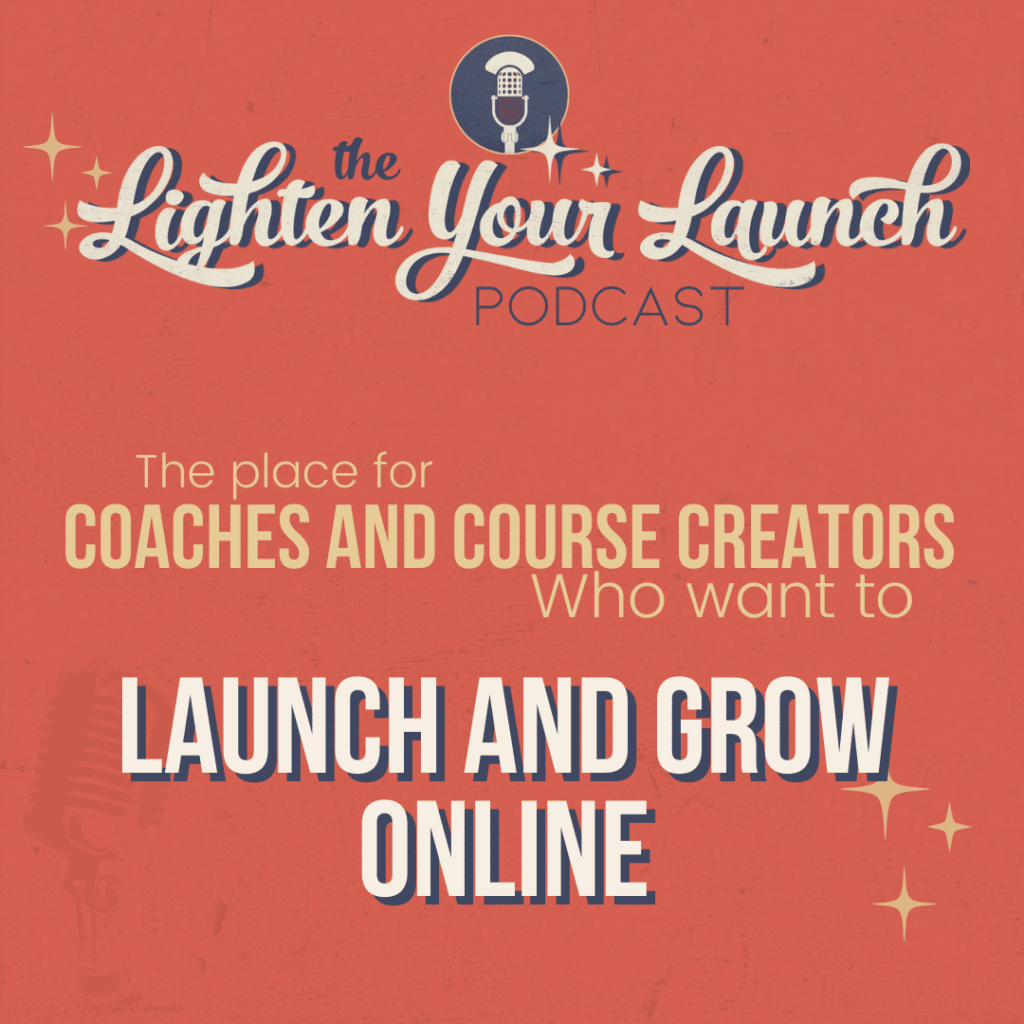
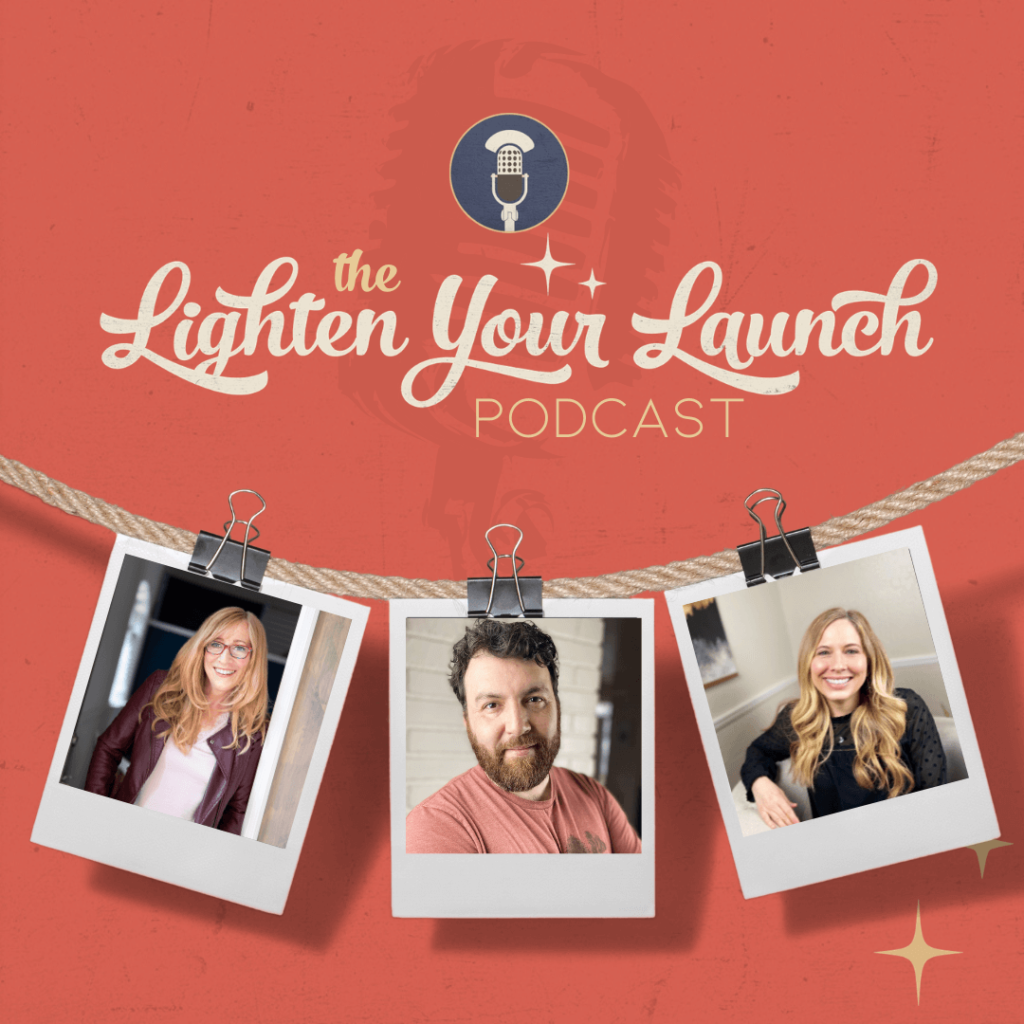


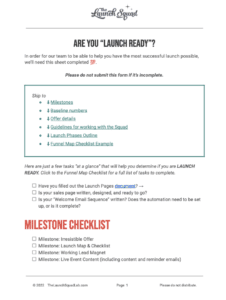
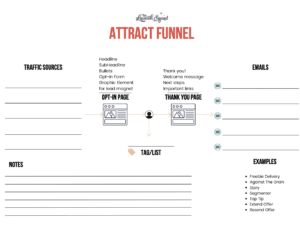
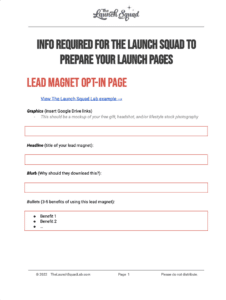
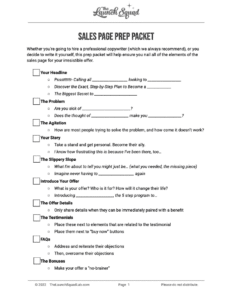
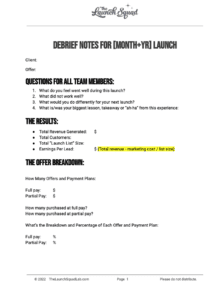
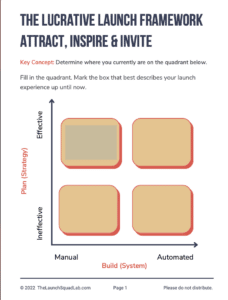
![Marketing Launch Calendar [TEMPLATE]](https://thelaunchsquadlab.com/wp-content/uploads/2023/05/Marketing-Launch-Calendar-TEMPLATE-300x260.png)
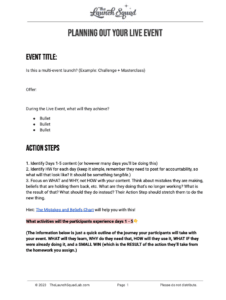

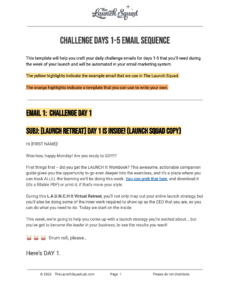
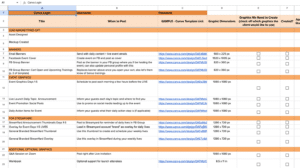
![[Updated] Email Templates for Launch](https://thelaunchsquadlab.com/wp-content/uploads/2023/05/Updated-Email-Templates-for-Launch-223x300.png)
![[REVISED] LS Pitch Script](https://thelaunchsquadlab.com/wp-content/uploads/2023/05/REVISED-LS-Pitch-Script-2023-226x300.png)

